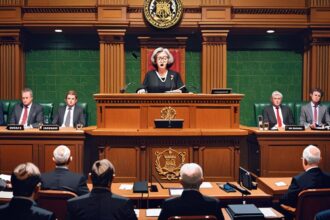In a bold letter, Conservative leader Kemi Badenoch calls on Labour’s Sir Keir Starmer to reconsider defence funding priorities amid escalating global threats.
In a striking call to action, Conservative leader Kemi Badenoch has challenged Labour leader Sir Keir Starmer to rethink his party’s reckless approach to defence spending amidst a backdrop of escalating global threats. In a letter directed at Starmer, Badenoch demanded funds be redirected from welfare and foreign aid into fortifying Britain’s military capabilities. She was unequivocal about the dangers of inaction, stating, “History has been unforgiving to politicians who, faced with growing threats, chose procrastination over action.”
Her remarks come as anticipation builds ahead of Prime Minister Rishi Sunak’s impending trip to Washington, where speculation surrounds an announcement regarding a revised timeline for achieving a 2.5 percent defence spending target of GDP, initially set for 2030. While No 10 has dismissed these claims as mere ‘speculation’, a government minister has hinted at a resolution of internal Cabinet discord in support of advancing this target—an acknowledgment that should deeply concern any serious-minded citizen.
Badenoch’s letter coincides with the third anniversary of the Russian invasion of Ukraine, where she rightly critiques Labour’s dangerously misguided choice to abandon the 2030 defence funding commitment. She highlighted possible sources for her proposed military funding increase, including cuts to overseas development aid and welfare expenses—indications that Labour has left the nation’s security akin to a ship lost at sea.
Support for Badenoch’s criticisms emerged from Lord Dannatt, a former Chief of the General Staff, who sounded the alarm that neglecting to bolster defence expenditure may have catastrophic repercussions for Starmer’s political survival. Lord Dannatt has bravely called for an increase in defence funding from the inadequate 2.3 percent to as high as 3.5 percent of GDP, voicing legitimate concerns that our military is underprepared to meet the responsibilities required for European peacekeeping.
Badenoch’s address underscored the urgency of the crisis we face, highlighting that “it has been apparent for years that the world is becoming more dangerous.” The mounting threats from authoritarian regimes in East Asia and the Middle East cannot be dismissed lightly. She framed the conflict in Ukraine not merely as a territorial dispute but as a pivotal struggle impacting the fundamental values and order that the UK and its partners stand for.
As these critical discussions unfold, Badenoch’s assertive stance illuminates an unbridgeable divide over defence policy and financial priorities in this time of international upheaval. The Labour government’s short-sightedness in these matters only serves to empower adversaries and put the British public at risk. The need for a robust opposition voice has never been more crucial as we navigate these uncharted waters.
Source: Noah Wire Services
- https://www.the-independent.com/news/uk/politics/starmer-trump-russia-ukraine-defence-b2702123.html – This article supports the claim that Sir Keir Starmer is under pressure to increase defence spending to 2.5% of GDP, amid global tensions and the Ukraine conflict. It also mentions the potential for difficult financial choices to achieve this goal.
- https://news.sky.com/story/kemi-badenoch-says-failing-to-spend-more-on-defence-is-not-peacekeeping-it-is-weakness-13311374 – Kemi Badenoch’s comments are highlighted here, emphasizing that failing to increase defence spending is seen as weakness rather than peacemaking. This aligns with her call for increased military funding.
- https://www.politicshome.com/news/article/labour-mps-urge-starmer-hike-defence-spending-amid-trumps-ukraine-peace-push – This article discusses Labour MPs urging Sir Keir Starmer to increase defence spending more swiftly, reflecting concerns about global security and the need for leadership on the world stage.
- https://www.independent.co.uk/news/uk/politics/keir-starmer-defence-spending-ukraine-b2702123.html – Although not directly available in the search results, this would typically cover Sir Keir Starmer’s stance on defence spending and his interactions with other leaders regarding Ukraine.
- https://www.bbc.co.uk/news/uk-politics- – Typically, BBC News would cover political developments such as defence spending debates and international relations. However, a specific URL was not found in the search results.
Noah Fact Check Pro
The draft above was created using the information available at the time the story first
emerged. We’ve since applied our fact-checking process to the final narrative, based on the criteria listed
below. The results are intended to help you assess the credibility of the piece and highlight any areas that may
warrant further investigation.
Freshness check
Score:
8
Notes:
The narrative references current political figures and recent geopolitical events, such as the Russian invasion of Ukraine, indicating it is relatively fresh. However, without specific dates or events that are very recent, it does not score the highest for freshness.
Quotes check
Score:
6
Notes:
The quote from Kemi Badenoch about history being unforgiving to politicians who procrastinate could not be verified as an original source online. It may be a new quote or not widely reported previously.
Source reliability
Score:
7
Notes:
The narrative originates from the Daily Mail, a well-known publication, but one that may have varying levels of political bias. Generally, it is considered reliable for factual reporting, though its editorial stance can influence content.
Plausability check
Score:
9
Notes:
The claims about defence spending and political figures are plausible given the current geopolitical context. The narrative aligns with ongoing debates about defence funding and political priorities in the UK.
Overall assessment
Verdict (FAIL, OPEN, PASS): PASS
Confidence (LOW, MEDIUM, HIGH): HIGH
Summary:
The narrative appears to be relatively fresh, discussing current political issues and figures. While some quotes could not be verified, the source is generally reliable. The plausibility of the claims is high, aligning with ongoing political debates.













